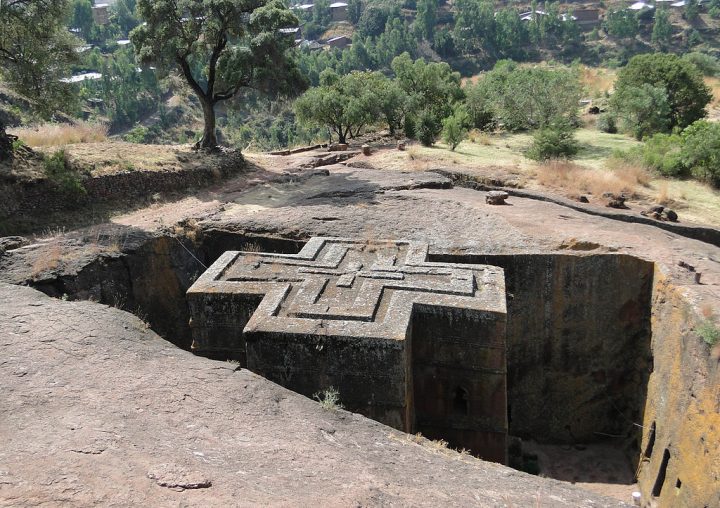The Kingdom of Aksum (also known as Axum) was formed in the first century BC in the northern region of Ethiopia. Although Its origins remain unclear we know that it was the first Christian kingdom in Africa and one of the most powerful.
At the height of its expansion, the empire stretched across areas of present-day Eritrea, Ethiopia, Yemen, southern Saudi Arabia, western Somalia, Djibouti and northern Sudan. It also had trading relationships with Roma, China, India and Persia. Rich in ivory, incense and gold, it was the first African kingdom to mint its own coins and was a meeting place for many different cultures including Egyptian, Nubian, Arab and Indian. Aksumite cities were home to Christians, Jews, Muslims and even Buddhist minorities. As the Aksumites gave shelter and protection to the first followers of Mohammed, Muslims – even after their religion had spread to the whole of North Africa – never attempted to overthrow the kingdom. Subsequently however the Kingdom of Aksum entered into a long and inexorable decline which culminated in the invasion of Queen Gudit (also known as Judith).
Between 320 and 360 AD, King Ezana became the kingdom’s first Christian sovereign. The Ethiopian orthodox church is therefore the only native Christian church with a significant history in sub-Saharan Africa. Prior to this, a traditional form of religion was practised and subsequently, under Menelik, the first son of Solomon and the Queen of Sheba, an African Judaism spread which used a different calendar to the Western and Hebrew version.
The Kingdom of Aksum is also noted for its extraordinary works of art and architecture, ranging from palaces to enormous obelisks and churches. The latter include 11 churches carved out of rock at Lalibela, constructed by the king who gave his name to the site and the inaccessible fortified monastery of Debré Damo. According to legend, one of the churches holds the Ark of the Covenant. The Semitic language Ge’ez was used in the liturgy and is still spoken today.
The Ethiopian Empire was founded in the 13th century; it proclaimed itself to be the continuation of the ancient Kingdom of Aksum and removed the last descendent of Queen Gudit from power. It succeeded in repelling Arab and Turkish forces and, together with Liberia, was the only African country to avoid colonisation. The exception to this was a brief period between 1936 and 1941 when Ethiopia was annexed to form part of Italian East Africa. Ras Tafari Makonnen, the country’s last emperor (better known as Haile Selassie) was removed in a coup in 1974.
Translation from Italian by Malcolm Gilmour






